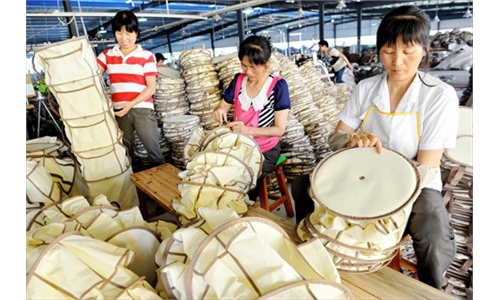China holds top financial meeting to strengthen supervision, ensure high-quality development

Lujiazui area in Shanghai Photo:Xinhua
The central financial work conference that concluded on Tuesday stressed to comprehensively strengthen financial supervision, improve the financial system, optimize financial services, prevent and resolve risks, unswervingly follow the path of financial development with Chinese characteristics, and promote high-quality financial development.
Xi Jinping, general secretary of the Communist Party of China Central Committee, delivered an important speech. Xi, also Chinese president and chairman of the Central Military Commission, analyzed the situations facing high-quality development of the financial sector and arranged relevant work for the current and future periods, according to the Xinhua News Agency.
The two-day conference, usually convened once every five years, is closely watched as it sets the direction for China's financial policymaking for the following years. Coming at a time of global economic woes and financial risks, this year's conference addressed various challenges and risks, including the housing market and local government debts, and outlined various efforts to ensure high-quality development.
The overall tone and policy priorities set at the conference underscored top policymakers' resolve to ensure stable and sound development in the financial industry despite global challenges and risks, which is set to offer a major boost in confidence in the country's financial industry as well as the Chinese economy as a whole, analysts said.
The conference stressed that finance is the lifeblood of the national economy and an important component of national core competitiveness. It called for building a financial powerhouse, strengthened financial supervision, an improved financial system, optimized financial services, and prevention of risks.
The meeting highlighted hard-won achievements in the country's financial development since the 18th CPC National Congress, while also calling for clear-eyed view of various contradictions and problems. It noted that there are still many hidden economic and financial risks, the quality and efficiency of financial services to the real economy are not high, illegal financial activities and financial corruption problems persist, and financial supervision and governance capabilities remain relatively weak.
"The financial system must be resolved to fundamentally solve these problems," the meeting said. It stressed that to ensure better financial work both for the present and the future, the CPC's overall leadership must be upheld and strengthened and the focus should be comprehensively enhancing financial supervision and preventing and resolving risks, among other works.
Strengthening the CPC's centralized and unified leadership is the fundamental guarantee for effective financial work, the meeting stressed, calling for improving the system and mechanism of the CPC's leadership in financial work and giving full play to the role of the Central Financial Commission. The commission, which is responsible for top-level planning, coordination, overall advancement of financial stability and development and for supervising the work's implementation, was set up as part of a plan on reforming Party and state institutions released in March.
Notably, in comparison with previous conferences, this year's conference focused very much on tackling challenges and risks the financial industry faces and addressed various issues that have drawn much attention recently such as the housing market and local government debts, said Guan Tao, global chief economist at BOC International under Bank of China.
"It not only addressed the issues head on, but also offered detailed plans to tackle those challenges, which is very much what many have been anticipating," Guan told the Global Times on Tuesday.
On local government debt risks, the meeting called for the establishment of a long-term mechanism to prevent and resolve local debt risks and a government debt management mechanism that is compatible with high-quality development.
On the housing market, the meeting urged to improve the supervision system and capital supervision of real estate enterprises, improve macro-prudential management of real estate financing, and meet the reasonable financing needs of real estate enterprises of different ownerships without discrimination.
"The meeting is important and contained a lot of content related to financial work in the real estate sector, which fully demonstrates the importance that the CPC Central Committee attaches to the work," Yan Yuejin, research director at Shanghai-based E-house China R&D Institute, told the Global Times on Tuesday, noting that supervision of real estate companies has been strengthened.
High-quality development
Historically, the high-level conference is a crucial window into China's financial policymaking. Since 1997, the conference has resulted in major reforms that have tackled different challenges and risks at different periods as well as setting long-term goals. The previous conference was held in 2017, which set three tasks - making the financial sector better serve the real economy, containing financial risks and deepening financial reforms.
"The meeting is about further promoting high-quality development in the financial industry," Dong Shaopeng, a senior research fellow at the Chongyang Institute for Financial Studies at the Renmin University of China, told the Global Times on Tuesday, noting that improving the quality of market entities and financial operations remains a key task, which requires strengthened supervision.
The meeting stressed that high-quality development is the primary task of building a modern socialist country in an all-round way, and the financial industry must provide high-quality services for economic and social development. Specifically, the meeting called for high-quality financial services in areas such as major strategies, important areas and weak links. More financial resources should be diverted to technological innovation, advanced manufacturing, green development and small- and medium-sized enterprises.
The meeting also called for efforts to promote high-level financial opening-up. Specifically, the meeting urged to steadily expand institutional opening-up in the financial sector, improve cross-border investment and financing facilitation, and attract more foreign financial institutions and long-term capital to expand and conduct businesses in China.
"Further opening-up is another goal," Dong said, adding that such efforts are not only aimed at attracting more foreign capital but are also about supervising and developing China's own capital market based on both external and internal factors.
The meeting also urged to ensure national financial and economic security, and prevent risk transmission across regions, markets and borders. This is likely a reference to the growing financial risks overseas, especially from the US, where aggressive monetary policies and chaotic political governance are threatening global markets.
Despite foreign media's claim of "foreign capital flight" out of China's financial market, China has continuously been opening up its financial market and remains a top destination for global capital. Between the end of 2017 and the end of the third quarter of 2023, total assets of foreign banks in China increased by 16.91 percent, and the assets of foreign insurance companies increased by 126 percent, China Media Group reported on Tuesday.




